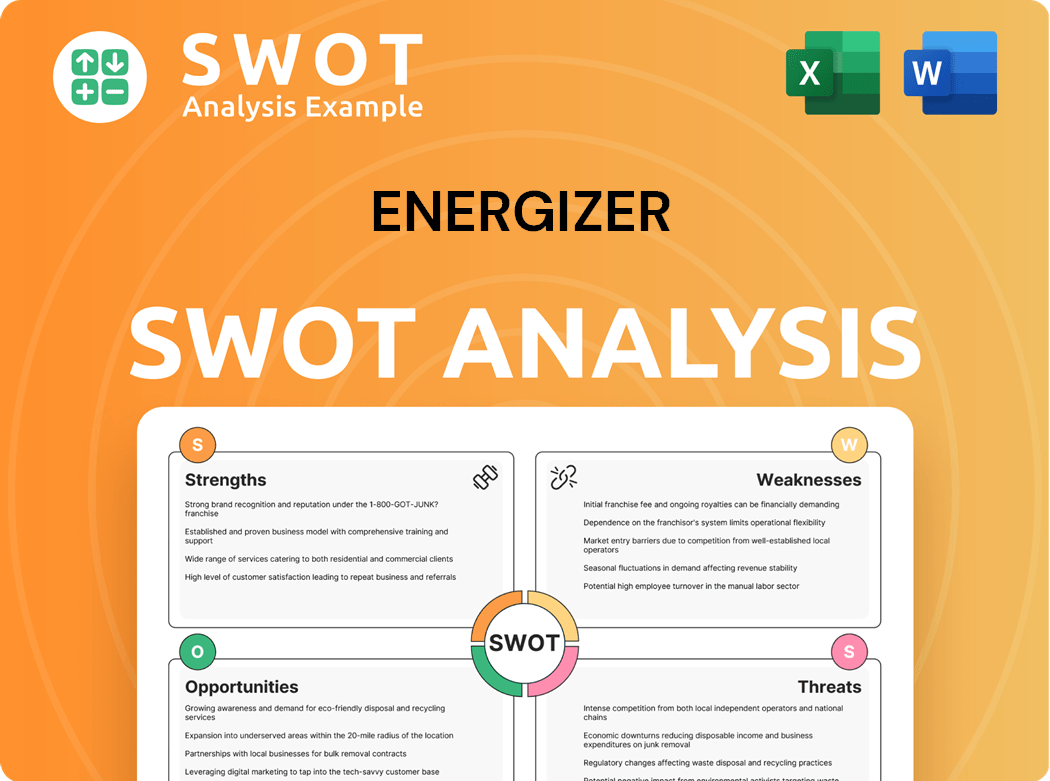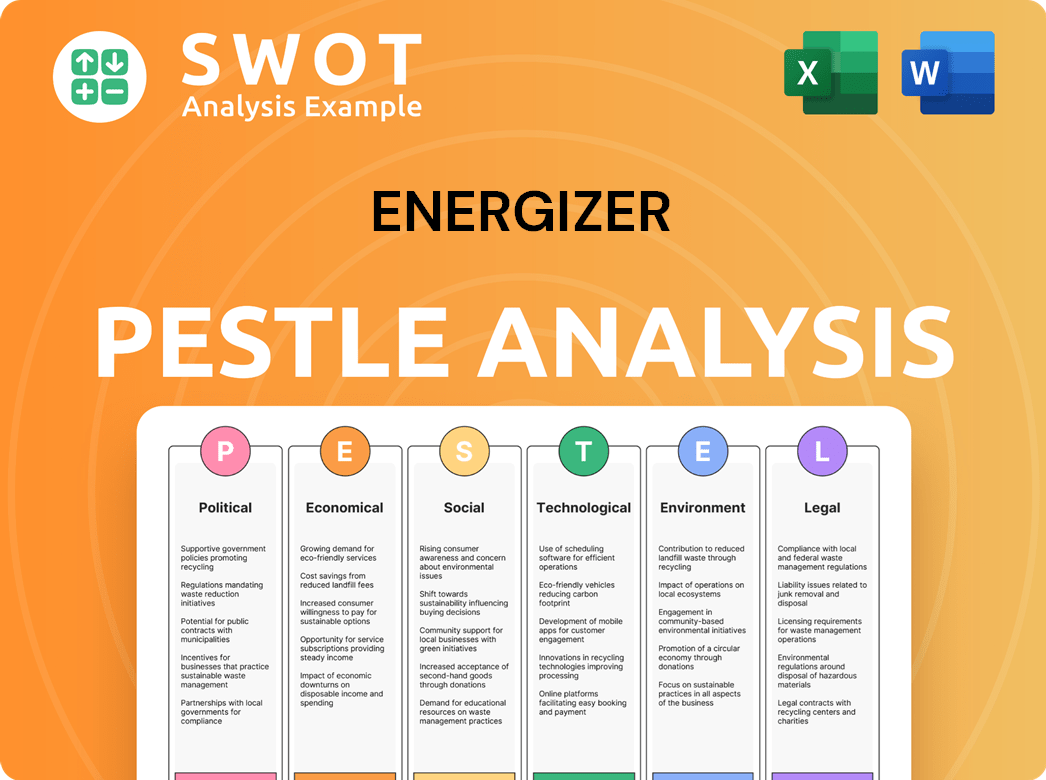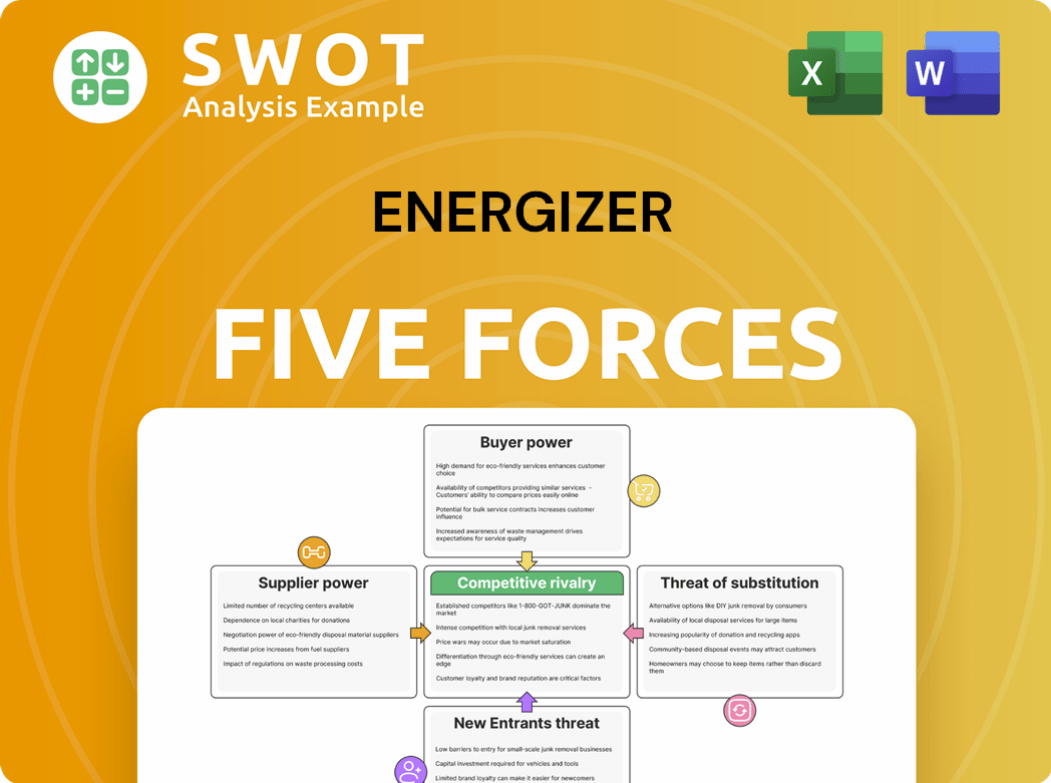Energizer Bundle
How Did Energizer Power Up the World?
Journey back in time to uncover the Energizer SWOT Analysis of a company that started with a spark and ignited a global revolution. From its humble beginnings as a manufacturer of carbon-arc lamps in 1896, the Energizer company has consistently innovated, transforming into a powerhouse in the battery market. Discover the fascinating Energizer history that shaped the portable power landscape.

The Energizer company's origin story is a testament to its adaptability and forward-thinking approach. As a leading battery manufacturer and Duracell competitor, Energizer's evolution showcases its ability to meet changing consumer needs. Explore the Energizer timeline and see how strategic decisions propelled it from a novelty lighting producer to a diversified consumer goods giant, impacting the battery industry worldwide.
What is the Energizer Founding Story?
The story of the Energizer company began in 1896. It all started with the American Electrical Novelty and Manufacturing Company in New York City. This company, founded by Conrad Hubert, marked the genesis of what would become a global leader in battery manufacturing.
Conrad Hubert, a Russian immigrant, saw an opportunity in the emerging field of portable lighting. His goal was to create a safe and convenient alternative to candles and oil lamps, which were the primary sources of personal illumination at the time. This led to the development of a revolutionary product.
The company's initial focus was on battery-powered novelties. The first significant product was a portable electric hand-held lamp, essentially the first flashlight. This invention combined a dry cell battery with a light bulb, offering a groundbreaking portable light source.
The company's early success was built on innovation and a keen understanding of market needs. The introduction of the flashlight was a pivotal moment.
- The "Eveready" brand, known for reliability, quickly gained recognition.
- Hubert's initial funding likely came from personal resources and early sales.
- The late 19th century's advancements in electricity and manufacturing were crucial.
- The company's origin story is a testament to entrepreneurial vision.
Energizer SWOT Analysis
- Complete SWOT Breakdown
- Fully Customizable
- Editable in Excel & Word
- Professional Formatting
- Investor-Ready Format

What Drove the Early Growth of Energizer?
The early growth of the Energizer company was fueled by the increasing demand for portable power. As a leading battery manufacturer, the company, initially known under the Eveready brand, focused on improving battery technology. This early focus helped establish the company as a key player in the burgeoning market for portable devices.
Early product launches included more efficient and longer-lasting dry cell batteries. These advancements were crucial for the widespread adoption of portable devices. By the early 20th century, the company expanded its product line to include batteries for various applications, such as radios and other emerging electrical appliances.
Initial team expansion was driven by the need for increased production and distribution. The company's first major sales milestones were tied to making batteries and flashlights accessible to a broader consumer base. Eveready entered new geographical markets across the United States, establishing a national presence.
A significant development was the acquisition by Union Carbide in 1914, providing substantial capital and research capabilities. This acquisition transformed the company into a larger industrial entity. Leadership transitions saw the integration of Eveready into Union Carbide's broader corporate structure, benefiting from scientific and engineering expertise.
Market reception to Eveready products was largely positive due to their convenience and reliability. The strategic shift under Union Carbide allowed the company to solidify its position as a dominant force in the battery industry. This laid the groundwork for future innovations and market leadership, setting the stage for the
Energizer PESTLE Analysis
- Covers All 6 PESTLE Categories
- No Research Needed – Save Hours of Work
- Built by Experts, Trusted by Consultants
- Instant Download, Ready to Use
- 100% Editable, Fully Customizable

What are the key Milestones in Energizer history?
The Energizer company has a rich history marked by significant milestones. From pioneering battery technology to strategic corporate restructuring, the company has consistently adapted to market demands and competitive pressures. These achievements and challenges are intrinsically linked to broader industry trends, such as the miniaturization of electronics and the increasing demand for sustainable power solutions.
| Year | Milestone |
|---|---|
| 1957 | Introduced the first miniature batteries for hearing aids. |
| 1959 | Launched the first alkaline AA battery, a groundbreaking innovation. |
| 2000 | Spun off from Ralston Purina, becoming an independent publicly traded company. |
| 2015 | Separated its household products business from its personal care division, creating two independent public companies. |
| 2019 | Acquired Spectrum Brands' Global Battery & Portable Lighting Business for approximately $2 billion. |
The Energizer batteries have consistently pushed the boundaries of battery technology. The introduction of alkaline batteries and miniature batteries showcased the company's commitment to innovation. These advancements have not only improved product performance but also expanded the range of devices that could be powered by their batteries.
The company was at the forefront of battery technology, especially with the introduction of the first miniature batteries for hearing aids in 1957. This early innovation set the stage for future advancements and solidified its position as a leader in the industry.
The launch of the first alkaline AA battery in 1959 was a pivotal moment. This innovation provided longer-lasting power and set a new standard for battery performance and reliability.
The company has consistently focused on miniaturization and efficiency. This has been crucial in meeting the evolving needs of consumer electronics, which demand smaller, more powerful batteries.
Continuous product development is a key focus. The company invests heavily in research and development to improve battery life, performance, and sustainability.
The company has been known for its iconic marketing campaigns, such as the Energizer Bunny. These campaigns have helped build brand recognition and customer loyalty.
The company has expanded its global presence through strategic acquisitions and partnerships. This has allowed it to reach new markets and strengthen its position in the battery industry.
The Energizer company has faced several challenges throughout its history. Competition from established players and new entrants in the battery market has been a constant pressure. The company has also had to navigate market downturns and adapt to changing consumer electronics trends.
The company has faced intense competition from both established battery manufacturers and new entrants. This competitive landscape requires continuous innovation and efficient operations to maintain market share.
Rapid advancements in consumer electronics have created challenges for battery manufacturers. The need for more efficient and compact power sources has driven the company to invest heavily in research and development.
The company has undergone several strategic restructurings, including the separation of its household products and personal care divisions. These moves aimed to streamline operations and unlock shareholder value.
The acquisition of other battery and lighting businesses, such as the Spectrum Brands' Global Battery & Portable Lighting Business in 2019, has presented integration challenges. Successfully integrating acquired businesses is crucial for realizing expected synergies and market expansion.
The company has had to navigate market downturns and economic fluctuations. These events can impact consumer spending and demand for battery products, requiring the company to adapt its strategies.
Growing environmental concerns have led to increased scrutiny of battery manufacturing and disposal practices. The company faces the challenge of developing more sustainable products and reducing its environmental footprint.
Energizer Business Model Canvas
- Complete 9-Block Business Model Canvas
- Effortlessly Communicate Your Business Strategy
- Investor-Ready BMC Format
- 100% Editable and Customizable
- Clear and Structured Layout

What is the Timeline of Key Events for Energizer?
The Energizer company, a prominent battery manufacturer, has a rich history dating back to the late 19th century. Its journey includes significant innovations and strategic shifts that have shaped its position in the market. This timeline highlights key milestones in the evolution of Energizer batteries.
| Year | Key Event |
|---|---|
| 1896 | Conrad Hubert established the American Electrical Novelty and Manufacturing Company, marking the company's inception. |
| 1898 | The introduction of the first commercial flashlight occurred, expanding the company's product offerings. |
| 1914 | The company was acquired by Union Carbide, which marked a significant change in ownership. |
| 1957 | The first miniature batteries for hearing aids were introduced, expanding the company's product range. |
| 1959 | The first alkaline AA battery was introduced, a major innovation in battery technology. |
| 1980 | The Energizer brand was introduced, becoming a recognizable name in the battery industry. |
| 2000 | Energizer Holdings, Inc. became an independent publicly traded company after spinning off from Ralston Purina. |
| 2015 | Energizer Holdings, Inc. separated its household products business from its personal care division, restructuring the company. |
| 2019 | The acquisition of Spectrum Brands' Global Battery & Portable Lighting Business, including VARTA and Rayovac brands, occurred. |
| 2023 | Energizer reported net sales of $2.9 billion for the fiscal year. |
| 2024 | Energizer continues to focus on innovation in sustainable battery technologies and expanding its auto care product lines. |
Energizer is investing in sustainable battery technologies to reduce environmental impact. This includes research into more efficient and eco-friendly battery production methods. The company is also exploring the use of recycled materials in its products. These initiatives align with growing consumer demand for sustainable products.
Energizer is focusing on expanding its presence in emerging markets to capitalize on growth opportunities. This involves tailoring products to meet the specific needs of these markets. The company is leveraging its global distribution network to reach a wider customer base. This strategy is expected to drive future revenue growth.
Energizer is expanding its auto care portfolio, aiming to increase its market share in this segment. This includes product innovation and strategic partnerships within the automotive industry. The company is capitalizing on the growing demand for automotive maintenance products. This expansion is expected to diversify its revenue streams.
Analysts predict stable growth for Energizer, driven by its diversified product offerings and strong market position. The company's commitment to consumer-centric innovation and operational excellence is key. Energizer's strategic initiatives are designed to ensure long-term value creation. The company is focused on adapting to changing market dynamics.
Energizer Porter's Five Forces Analysis
- Covers All 5 Competitive Forces in Detail
- Structured for Consultants, Students, and Founders
- 100% Editable in Microsoft Word & Excel
- Instant Digital Download – Use Immediately
- Compatible with Mac & PC – Fully Unlocked

Related Blogs
- What is Competitive Landscape of Energizer Company?
- What is Growth Strategy and Future Prospects of Energizer Company?
- How Does Energizer Company Work?
- What is Sales and Marketing Strategy of Energizer Company?
- What is Brief History of Energizer Company?
- Who Owns Energizer Company?
- What is Customer Demographics and Target Market of Energizer Company?
Disclaimer
All information, articles, and product details provided on this website are for general informational and educational purposes only. We do not claim any ownership over, nor do we intend to infringe upon, any trademarks, copyrights, logos, brand names, or other intellectual property mentioned or depicted on this site. Such intellectual property remains the property of its respective owners, and any references here are made solely for identification or informational purposes, without implying any affiliation, endorsement, or partnership.
We make no representations or warranties, express or implied, regarding the accuracy, completeness, or suitability of any content or products presented. Nothing on this website should be construed as legal, tax, investment, financial, medical, or other professional advice. In addition, no part of this site—including articles or product references—constitutes a solicitation, recommendation, endorsement, advertisement, or offer to buy or sell any securities, franchises, or other financial instruments, particularly in jurisdictions where such activity would be unlawful.
All content is of a general nature and may not address the specific circumstances of any individual or entity. It is not a substitute for professional advice or services. Any actions you take based on the information provided here are strictly at your own risk. You accept full responsibility for any decisions or outcomes arising from your use of this website and agree to release us from any liability in connection with your use of, or reliance upon, the content or products found herein.